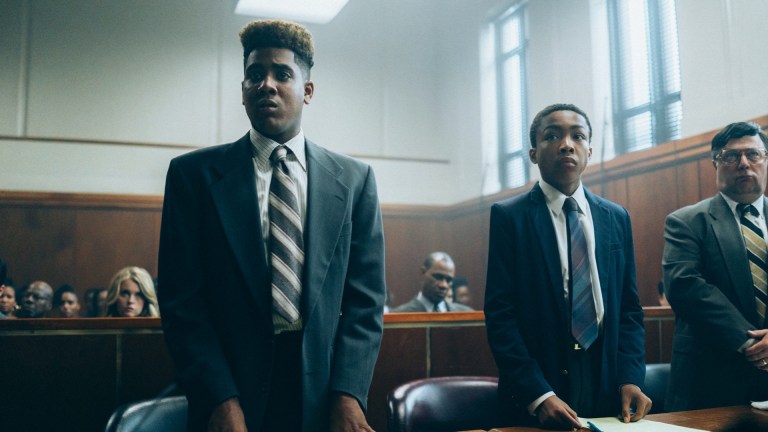Ava DuVernay Launches Law Enforcement Accountability Project to Hold Police Officers Accountable
When They See Us director Ava DuVernay will fund the spotlighting of bad cops in new initiative Law Enforcement Accountability Project.

Activist storytelling has a new outlet. Director Ava DuVernay’s new initiative aims to disrupt the “blue code of silence.” She is sick of cops who kill black people without consequences, whose names don’t even get mentioned in the headlines. DuVernay is launching an initiative designed to hold police officers accountable, whether or not they have been charged for their crimes, through the Law Enforcement Accountability Project initiative.
LEAP will fund 25 projects over the next two years, according to The Washington Post. It will be funded through DuVernay’s Array Alliance nonprofit. It has an initial budget of $3 million from contributors including Ryan Murphy (American Horror Story, Glee) and the Ford Foundation. The fund is designed to empower activists to tell stories across multiple forms of media.
“LEAP is the Law Enforcement Accountability Project, a propulsive fund dedicated to empowering activists as they pursue narrative change around the police abuse of Black People,” reads LEAP’s webpage. “Our mission is to disrupt the code of silence that exists around police aggression and misconduct. We will no longer accept this. We will tell the true stories. The goal of LEAP is to elevate activist storytelling around police brutality and murder through funding short-term projects in film, theater, photography, fine art, music, poetry, literature, sculpture and dance. Change begins with the stories we tell each other about the police and Black people. This is our work. The fund is powered by advocates who believe in police transparency and visibility.”
DuVernay was inspired to enact the initiation after repeatedly watching 17-year-old Darnella Frazier’s video of George Floyd. “I’m used to watching racist, violent images,” DuVernay told The Washington Post. “So why did George Floyd’s final moments devastate me like it did? I realized that it was because this time the cop isn’t hidden behind a body cam or distorted by grainy surveillance video. This time, I can see the cop’s face. As a viewer, there are several times when he even looks right at me. Then . . . I started to realize how rare that is. And that led me to think, ‘how many of these police officers do we never see?’ They disappear, end up leaving town, and show up in another department. Their names are said, but it’s never amplified and it’s kind of like this group contract. Somehow, we, as American citizens, have agreed to not speak their names. I do not agree to that anymore.”
DuVernay announced The Law Enforcement Accountability Project during an appearance on The Ellen DeGeneres Show on Monday. “We’re asking for narrative change and we’re creating narrative change around police abuse, misconduct and murder of black people,” DuVernay told DeGeneres. “We’re changing the lens of the story.”
Frazier saw Floyd being pulled out of the car while she was walking her 9-year-old cousin to a corner store and began filming, documenting the scene of police officer Derek Chauvin pinning Floyd under his knee for over eight minutes. “I started to realize how rare that is,” DuVernay told DeGeneres. “And that led me to think, ‘How many of these police officers do we never see?’ They disappear, end up leaving town, and show up in another department. Their names are said, but it’s never amplified and it’s kind of like this group contract. Somehow, we, as American citizens, have agreed to not speak their names. I do not agree to that anymore.”
The feeling is reflected in other activist leaders. “Too often, the narrative after an incident of police violence defames the character and past of victimized Black people instead of interrogating the system of policing itself and holding it accountable,” Movement for Black Lives national field director Karissa Lewis, said in a statement to The Washington Post. “It’s about time we trained the camera on those responsible for the intractable brutality in American policing today.”
As a director, DuVernay amplifies black issues. With Disney’s A Wrinkle in Time, DuVernay was the first black woman to direct a live-action film which earned $100 million at the box office. Her 2012 independent feature film Middle of Nowhere examined the texture of the lives of women who live in Compton. Her 2014 film Selma dramatized the 1965 voting marches from Selma to Montgomery, Alabama, strategized by James Bevel and led by Martin Luther King Jr., Hosea Williams, and John Lewis. Her 2019 miniseries When They See Us explored the 1989 Central Park jogger case where five black teenagers were wrongly convicted based on coerced confessions, tainted evidence and a rush to conclusion. She took on the prison industrial complex in the documentary 13th.
“When I look at George Floyd’s tape, I see my uncles,” DuVernay told DeGeneres. “Not just in a general sense, but he looks like people in my family, like literally the facial features. Every time that that video plays on CNN or anything else, I see people that I love on the ground begging for their life.”
LEAP is envisioned as a two-year project to launch at least 25 works of art. LEAP’s first project is scheduled to go live in August.
